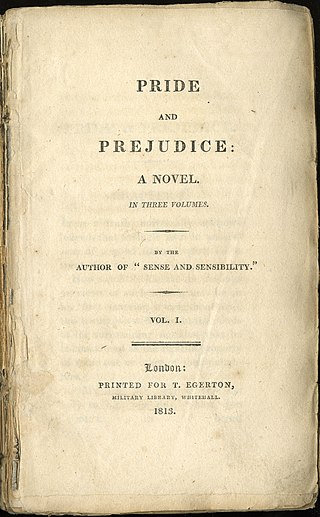
Pride and Prejudice is the second novel by English author Jane Austen, published in 1813. A novel of manners, it follows the character development of Elizabeth Bennet, the protagonist of the book, who learns about the repercussions of hasty judgments and comes to appreciate the difference between superficial goodness and actual goodness.

A story within a story, also referred to as an embedded narrative, is a literary device in which a character within a story becomes the narrator of a second story. Multiple layers of stories within stories are sometimes called nested stories. A play may have a brief play within it, such as in Shakespeare's play Hamlet; a film may show the characters watching a short film; or a novel may contain a short story within the novel. A story within a story can be used in all types of narration including poems, and songs.

Christopher Darlington Morley was an American journalist, novelist, essayist and poet. He also produced stage productions for a few years and gave college lectures.
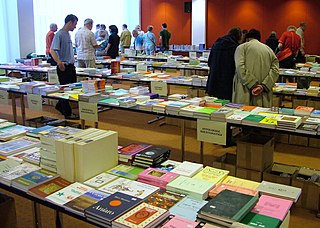
Literature in the Esperanto language began before the first official publication in Esperanto in 1887: the language's creator, L. L. Zamenhof, translated poetry and prose into the language as he was developing it as a test of its completeness and expressiveness, and published several translations and a short original poem as an appendix to the first book on the language, Unua Libro. Other early speakers wrote poetry, stories, and essays in the language; Henri Vallienne was the first to write novels in Esperanto. The first female Esperanto novelist was Edith Alleyne Sinnotte with her book Lilio published in 1918. Except for a handful of poems, most of the literature from Esperanto's first two decades is now regarded as of historical interest only.

The Black Tulip is a historical novel and a work of Romantic poetry written by Alexandre Dumas, père, and first published in 1850.

Babbitt (1922), by Sinclair Lewis, is a satirical novel about American culture and society that critiques the vacuity of middle class life and the social pressure toward conformity. The controversy provoked by Babbitt was influential in the decision to award the Nobel Prize in Literature to Lewis in 1930. The novel has been filmed twice, once as a silent in 1924 and remade as a talkie in 1934.
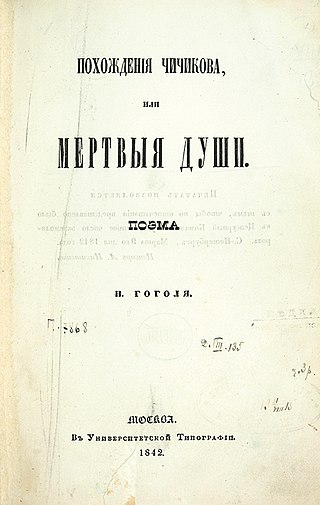
Dead Souls is a novel by Nikolai Gogol, first published in 1842, and widely regarded as an exemplar of 19th-century Russian literature. The novel chronicles the travels and adventures of Pavel Ivanovich Chichikov and the people whom he encounters. These people typify the Russian middle aristocracy of the time. Gogol himself saw his work as an "epic poem in prose", and within the book characterised it as a "poem in prose". Gogol intended the novel to be the first part of a three-volume work, but burned the manuscript of the second part shortly before his death. Although the novel ends in mid-sentence, it is regarded by some as complete in the extant form.

The Gift is Vladimir Nabokov's final Russian novel, and is considered to be his farewell to the world he was leaving behind. Nabokov wrote it between 1935 and 1937 while living in Berlin, and it was published in serial form under his pen name, Vladimir Sirin.
References to Esperanto, a constructed language, have been made in a number of films and novels. Typically, this is done either to add the exotic nature of a foreign language without representing any particular ethnicity, or to avoid going to the trouble of inventing a new language. In science fiction, Esperanto is sometimes used to represent a future in which there is a more universally spoken language than exists today.

Korean literature is the body of literature produced by Koreans, mostly in the Korean language and sometimes in Classical Chinese. For much of Korea's 1,500 years of literary history, it was written in Hanja. It is commonly divided into classical and modern periods, although this distinction is sometimes unclear.

Kristin Lavransdatter is a trilogy of historical novels written by Sigrid Undset. The individual novels are Kransen, first published in 1920, Husfrue, published in 1921, and Korset, published in 1922. Kransen and Husfrue were translated from the original Norwegian as The Bridal Wreath and The Mistress of Husaby, respectively, in the first English translation by Charles Archer and J. S. Scott.

Szathmári Sándor was a Hungarian writer, mechanical engineer, Esperantist, and one of the leading figures in Esperanto literature.
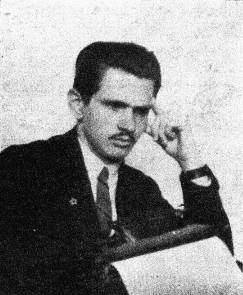
Jan Fethke was a German-Polish film director and, under the pen name Jean Forge, a successful author. He also was a famous proponent of the language Esperanto.

Broken Embraces is a 2009 Spanish romantic drama film written, produced, and directed by Pedro Almodóvar. Led by an ensemble cast consisting of many Almodóvar regulars, it stars Lluís Homar as a blind Madrilenian screenwriter who recalls his tragic love for Lena, played by Penélope Cruz, the deceased lead actress in his last directional feature Girls and Suitcases, who was also the mistress of a powerful, obsessive businessman. Blanca Portillo co-stars as his agent Judit, while Tamar Novas portrays her son and Caine's co-writer Diego.

Sinhá Moça is a Brazilian telenovela produced and broadcast by TV Globo. It premiered on March 13, 2006, replacing Alma Gêmea, and ended on October 13, 2006, replaced by O Profeta. It is written by Benedito Ruy Barbosa, inspired by the eponymous book by Maria Dezonne Pacheco Fernandes, it is a readaptation for television, and counted on the collaboration of authors Edmara Barbosa and Edilene Barbosa.

Princess Lover! is a Japanese visual novel and the first title developed by Ricotta. It was first released as an eroge for Microsoft Windows on June 27, 2008, in both limited and regular editions, which was followed by an all-ages release for the PlayStation 2 on January 28, 2010. The gameplay in Princess Lover! follows a linear plot line which offers pre-determined scenarios and courses of interaction, and its story focuses on the appeal of the four female main characters.
Geumo Sinhwa is a collection of novellas, written in Chinese characters by a Korean author Kim Si-sŭp. Like most of the early literature of Korea it forms part of the Chinese-language literature of Korea.

Burning Grass is a novel by Nigerian author Cyprian Ekwensi. It was published in 1962 as the second book in Heinemann's African Writers Series.
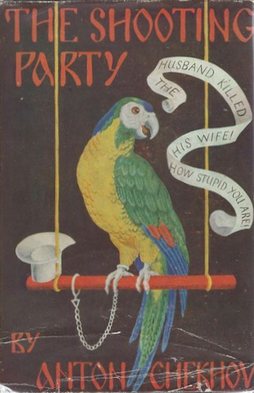
The Shooting Party is an 1884 novel by Anton Chekhov. It is his longest narrative work, and only full-length novel. Framed as a manuscript given to a publisher, it tells the story of an estate forester's daughter in a provincial Russian village, who is stabbed to death in the woods during a hunting party, and the efforts to uncover her killer.

















